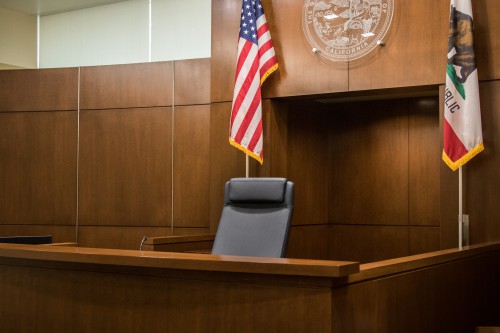 By Mariel Barbadillo
By Mariel Barbadillo
On November 21, 2016, Judge Paul K. Richardson denied a motion, pursuant to California Penal Code section 995, to dismiss charges in the case of Khaddijan Avington. Ms. Avington, represented by Deputy Public Defender Andrea Pelochino, is charged with second-degree burglary and grand theft of 10 purses in excess of $950 dollars from Marshalls in Woodland.
The defense, however, contended that the evidence presented by the People to substantiate those charges at the preliminary hearing on September 1, 2016, was inadmissible hearsay.
In particular, the defense questioned the admissibility of the testimony of “NR,” a National Task Force Investigator for T.J. Maxx, Marshalls, and Home Goods stores. NR testified that on July 24, 2015, he was called to respond to a theft at Marshalls.
He reviewed the store’s surveillance footage, in which a female suspect was seen entering the store empty-handed. Later, the same individual was seen leaving the store with 10 handbags on her arm.
He later received reports of returned merchandise at various locations in the Bay Area.
According to his testimony, NR was able to identify the defendant as the perpetrator because, when customers return items greater than $100 without proof of purchase, the store requires government-issued identification and manager approval to complete the transaction. This information is then entered into the store database. NR accessed the database with this information and found records of the refunds, name, and address of the defendant.
He also determined the total amount of stolen merchandise to be valued at $1499, with the purses costing approximately $149 each.
The defense argued that the evidence provided by NR is improper hearsay because his testimony about how information is entered into the store database is beyond his capacity as an investigator and he was not personally responsible for creating the records relied upon as evidence.
The People, represented by Deputy District Attorney David Robbins, asked to have NR’s testimony admitted according to the business records exception under Evidence Code section 1280, which allows recorded writings to be admissible under certain conditions. The code states that “evidence of a writing made as a record of an act, condition, or event is not made inadmissible by the hearsay rule” when the writing was made within the scope of a public employee’s duty.
However, the database entries used as evidence were made by a Marshalls cashier, who is not considered a “public employee,” such as an officer, agent, or employee of a public entity.
In addition, the People did not present witness testimony as to whether the store followed protocol in this case regarding returns, if a manager input the information into the system, or if the information entered into the database regarding the defendant’s identity and items returned were accurate.
Thus, the defense argued, NR’s testimony regarding database entries should not be permitted as an exception of hearsay. Without such testimony, there is insufficient evidence to hold Ms. Avington to answer for the charges.
In the People’s opposition to the motion, Mr. Robbins rebutted, saying that NR’s testimony is, in fact, admissible hearsay. NR had personally reviewed the surveillance footage and received reports of handbags returned throughout the Bay Area. Based on the footage and reports, the People contended that NR accurately identified the defendant as the individual involved in both situations.
Regarding the store’s protocol item returns over $100, NR “opined” that the database of items returned, the names of the individual returning the items, and their addresses was regularly maintained. He testified to having accessed the database numerous times before.
The People contended that NR’s testimony to his familiarity with the system and the database entry process as “ordinary course of business” makes the evidence admissible under EC section 1280.
Furthermore, Mr. Robbins stated that evidence to establish foundation for business record hearsay does not necessarily have to be presented by the employee who personally prepared the records. A “qualified witness” who can testify to the mode or preparation of such documents, such as NR, can suffice.
The prosecution thus concluded that the court properly allowed evidence during the preliminary hearing, although it was hearsay, under Evidence Code section 1280. They argued that the information should not be set aside, as it provides rational grounds for the possibility that the defendant committed the crime in question.
After considering the defense’s motion and the People’s opposition, Judge Richardson ultimately denied the motion to dismiss the charges of grand theft and burglary against Ms. Avington. Ms. Avington remains on supervised own recognizance (OR). The next court appearance for this case will be on February 6, 2017, at 8:30 AM.




